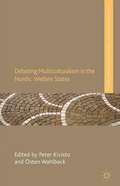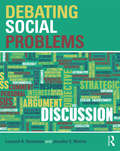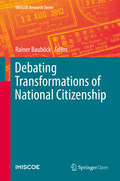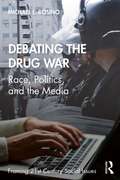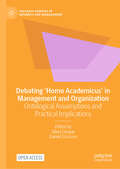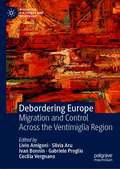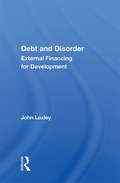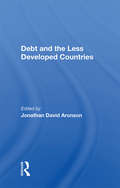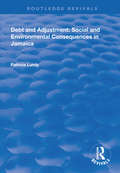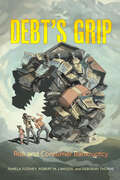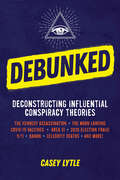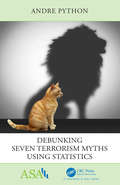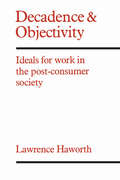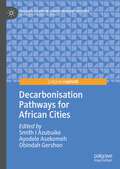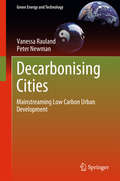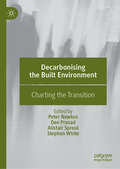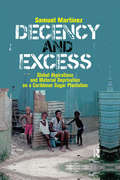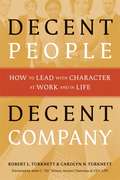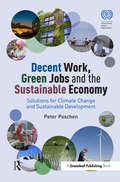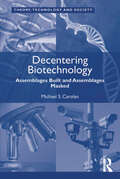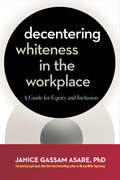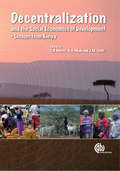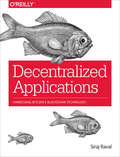- Table View
- List View
Debating Multiculturalism in the Nordic Welfare States
by Peter Kivisto �sten WahlbeckThis collection addresses the ways that Nordic countries have approached the issue of bringing ethnic minorities into the societal mainstream. With multicultural incorporation as an option, the authors explore the potential impact of the politics of identity in societies with social democratic welfare states committed to redistributive politics.
Debating Sharia
by Jennifer Selby Anna KortewegWhen the Islamic Institute of Civil Justice announced it would begin offering Sharia-based services in Ontario, a subsequent provincial government review gave qualified support for religious arbitration. However, the ensuing debate inflamed the passions of a wide range of Muslim and non-Muslim groups, garnered worldwide attention, and led to a ban on religiously based family law arbitration in the province. Debating Sharia sheds light on how Ontario's Sharia debate of 2003-2006 exemplified contemporary concerns regarding religiosity in the public sphere and the place of Islam in Western nation states.Focusing on the legal ramifications of Sharia law in the context of rapidly changing Western liberal democracies, Debating Sharia approaches the issue from a variety of methodological perspectives, including policy and media analysis, fieldwork, feminist examinations of the portrayals of Muslim women, and theoretical examinations of religion, Sharia, and the law. This volume is an important read for those who grapple with ethnic and religio-cultural diversity while remaining committed to religious freedom and women's equality.
Debating Social Problems
by Leonard A. Steverson Jennifer MelvinDebating Social Problems emphasizes the process of debate as a means of addressing social problems and helps students engage in active learning. The debate format covers sensitive material in a way that encourages students to talk about this material openly in class. This succinct text includes activities that promote critical thinking and includes examples from current events.
Debating Transformations of National Citizenship (IMISCOE Research Series)
by Rainer BauböckThis open access book discusses how national citizenship is being transformed by economic, social and political change. It focuses on the emergence of global markets where citizenship is for sale and on how new reproduction technologies impact citizenship by descent. It also discusses the return of banishment through denationalisation of terrorist suspects, and the impact of digital technologies, such as blockchain, on the future of democratic citizenship. The book provides a wide range of views on these issues from legal scholars, political scientists, and political practitioners. It is structured as a series of four conversations in which authors respond to each other. This exchange of arguments provides unique depth to current debates about the future of citizenship.
Debating the Drug War: Race, Politics, and the Media (Framing 21st Century Social Issues)
by Michael RosinoSince President Nixon coined the phrase, the "War on Drugs" has presented an important change in how people view and discuss criminal justice practices and drug laws. The term evokes images of militarization, punishment, and violence, as well as combat and the potential for victory. It is no surprise then that questions such as whether the "War on Drugs" has "failed" or "can be won" have animated mass media and public debate for the past 40 years.Through analysis of 30 years of newspaper content, Debating the Drug War examines the social and cultural contours of this heated debate and explores how proponents and critics of the controversial social issues of drug policy and incarceration frame their arguments in mass media. Additionally, it looks at the contemporary public debate on the "War on Drugs" through an analysis of readers’ comments drawn from the comments sections of online news articles.Through a discussion of the findings and their implications, the book illuminates the ways in which ideas about race, politics, society, and crime, and forms of evidence and statistics such as rates of arrest and incarceration or the financial costs of drug policies and incarceration are advanced, interpreted, and contested. Further, the book will bring to light how people form a sense of their racial selves in debates over policy issues tied to racial inequality such as the "War on Drugs" through narratives that connect racial categories to concepts such as innocence, criminality, free will, and fairness. Debating the Drug War offers readers a variety of concepts and theoretical perspectives that they can use to make sense of these vital issues in contemporary society.
Debating ‘Homo Academicus’ in Management and Organization: Ontological Assumptions and Practical Implications (Palgrave Debates in Business and Management)
by Daniel Ericsson Silvia CinqueIn the fields of management and organization, there is an ongoing debate about different ontological assumptions about people in and around organizations, and the dangers of self-fulling prophecies, i.e., the phenomena in which unsubstantiated, unethical, or dysfunctional assumptions about people can lead to adverse practical consequences. This open access book advances this debate, but in a self-reflexive direction, asking: Who do we, as scholars in the fields of management and organization, think we are? What ontological assumptions about ourselves do we live by? Do we think we are something “special”, a 'Homo Academicus', distinctively separated from the life-world of managers and employees but linked with other academics such as, say, philosophers and sociologists? If so, what are the consequences and implications of such assumptions? Part of the popular Palgrave Debates in Business and Management series, each of the chapters disclose, problematize, and criticize different ontological assumptions about 'Homo Academicus' that underpins research in the fields of management and organization. It will be of great interest to management and organization scholars and students, as well as those with a broader interest in methodology and critical studies.
Debordering Europe: Migration and Control Across the Ventimiglia Region (Migration, Diasporas and Citizenship)
by Gabriele Proglio Livio Amigoni Silvia Aru Ivan Bonnin Cecilia VergnanoThis contributed volume analyzes in depth how a border area is constantly reshaped as migration policies harden, and what kind of social, political and economic impacts are produced at local and international level. The study is focused on Ventimiglia, an Italian town located 6 km away from the French-Italian border on the gulf of Genoa with a long story of commerce, custom and smuggling activities related to its proximity to the frontier. While several projects have analyzed other symbolic places of the EU migration crisis such as Lampedusa, Calais and Lesvos, there is a severe empirical gap regarding Ventimiglia, a border town at the very geographic core of the Schengen area. This case study may provide emblematic insights into what European migratory movements are currently revealing in terms of the lack of shared responsibility between EU Member States, the EU common asylum system and respect for human rights, with increasing claims for national sovereignty by some Member States.
Debt And Disorder: External Financing For Development
by John LoxleyOne of the most important and controversial challenges feeing the international financial and trading system is the need for developing countries to meet their high and rapidly growing external debt obligations and foreign exchange requirements. Developing countries have suffered major shocks in the form of global recession, high real interest rates, weakened terms of trade, and rising protectionism against their exports. The International Monetary Fund, the World Bank, Western central banks, and private financial institutions are seeking to avoid a collapse of the international financial system, and developing countries are seeking to grow through increased trade and access to external financing. Yet the fragility of current international trade and monetary systems seriously threatens the achievement of both sets of objectives. Professor Loxley integrates the structural adjustment experience of Third World countries with the policies, practices, and relationships of external financial agents in his discussion of options for reforming policy and of the limitations inherent in implementing these reforms.
Debt And The Less Developed Countries
by Jonathan David AronsonScholars and practitioners from the fields of economics, political science, sociology, and government discuss the nature and importance of debt in the international system and question whether international debt is a necessary element of international development or a potential root of international economic collapse (and of the demise of the dollar as denominator of the monetary realm). They then turn specifically to the impact of external debt on developing countries, exploring the potential for both positive and negative effects. In the final section of the book they look at the interactions between debtors and creditors when loans begin to sour.
Debt and Adjustment: Social and Environmental Consequences in Jamaica (Routledge Revivals)
by Patricia LundyPublished in 1999, this text is based on original research carried out during 13 months fieldwork in Jamaica. The first key theme is an examination of the damage to the social environment and ecology of the island, which has resulted from IMF/World Bank prescribed structural adjustment policies. The second is the identification of a social movement in Jamaica of community environmental groups, some based in ultra-poor squatter communities. The study presents data and case studies which are characteristic of many "third world" countries, and links Jamaica's heavy external indebtedness to its deteriorating social environment and ecology.
Debt's Grip: Risk and Consumer Bankruptcy
by Pamela FooheyDebt’s Grip tells the story of financial struggle in the United States. Drawing on original data from the Consumer Bankruptcy Project, a landmark long-term study, the authors use the words of bankruptcy filers themselves to shed light on their battles to keep their homes and their cars, pay for healthcare and higher education, care for their children, find adequate employment, retire, negotiate with debt collectors, and confront discrimination in lending. Laying bare the consequences of risk privatization, this book makes a powerful case for why the United States must confront the structural inequities that cause so many—especially Black families, women, and the elderly—to struggle in today’s economy.
Debt: Ethics, the Environment, and the Economy
by Peter Y. Paik Merry Wiesner-HanksFrom personal finance and consumer spending to ballooning national expenditures on warfare and social welfare, debt is fundamental to the dynamics of global capitalism. The contributors to this volume explore the concept of indebtedness in its various senses and from a wide range of perspectives. They observe that many views of ethics, citizenship, and governance are based on a conception of debts owed by one individual to others; that artistic and literary creativity involves the artist's dialogue with the works of the past; and that the specter of catastrophic climate change has underscored the debt those living in the present owe to future generations.
Debunked EBK: Separate the Rational from the Irrational in Influential Conspiracy Theories
by Casey LytleHead down the rabbit hole and feed your fascination for conspiracy and controversy. Conspiracy theories-they're influential and spread to sometimes irrational extremes. Why do people cling to conspiracy theories so powerfully? Is there a way to separate the possible from the impossible? Yes. Enter: Debunked.Conspiracy theories pop up surrounding every major national and global event-some are possible, some are not. TikTok influencer and psychology professor Casey Lytle will teach you how to be an intelligent consumer of "alternative" theories. Lytle's trademark "project management approach" will help you discern possible from impossible in the popular and controversial theories surrounding 10 national and global events.9/11-No fewer than 10 alternative theories have gained traction. But let's evaluate: Did the Twin Towers really look like a controlled demolition? Would jet fuel have to melt steel for the towers to collapse? What would it take in hours and people to secretly plant enough explosives to bring the buildings down without being discovered, and without being set off by the impact and fires from the planes? All this and more in Chapter 7.COVID-19-The vaccine implants a microchip used to track people; the fatality rate has been wildly inflated; oh, and Bill Gates is not only responsible for the virus but also the head of a plot to use the virus as population control.School shooters-why are they so easy to explain, but so hard to predict? In what ways has the profile of a school shooter changed over the last 25 years, and what has caused those changes? Are school shootings a new phenomenon, or does the media simply make us more aware of them when they happen? The chapter will cover Sandy Hook conspiracy theories, as well as the psychology behind "truthers."
Debunking Seven Terrorism Myths Using Statistics (ASA-CRC Series on Statistical Reasoning in Science and Society)
by Andre PythonWhat is terrorism? What can we learn and what cannot we learn from terrorism data? What are the perspectives and limitations of the analysis of terrorism data? Over the last decade, scholars have generated unprecedented insight from the statistical analysis of ever-growing databases on terrorism. Yet their findings have not reached the public. This book translates the current state of knowledge on global patterns of terrorism free of unnecessary jargon. Readers will be gradually introduced to statistical reasoning and tools applied to critically analyze terrorism data within a rigorous framework. Debunking Seven Terrorism Myths Using Statistics communicates evidence-based research work on terrorism to a general audience. It describes key statistics that provide an overview of the extent and magnitude of terrorist events perpetrated by actors independent of state governments across the world. The books brings a coherent and rigorous methodological framework to address issues stemming from the statistical analysis of terrorism data and its interpretations. Features Uses statistical reasoning to identify and address seven major misconceptions about terrorism. Discusses the implications of major issues about terrorism data on the interpretation of its statistical analysis. Gradually introduces the complexity of statistical methods to familiarize the non-statistician reader with important statistical concepts to analyze data. Use illustrated examples to help the reader develop a critical approach applied to the quantitative analysis of terrorism data. Includes chapters focusing on major aspects of terrorism: definitional issues, lethality, geography, temporal and spatial patterns, and the predictive ability of models.
Decadence and Objectivity: Ideals for Work in the Post-consumer Society
by Lawrence HaworthHaworth's concerns are urgent. Modern society, he argues, threatens to collapse under the burden of mindless growth. Its demands have begun to exhaust the world's resources. The pursuit of growth has hollowed out our social foundations. Advanced technology has emancipated us from toil but condemned us to work that is perceived as meaningless. The dissolution of traditional communities has resulted in a society which has no sense of common concern or public purpose. Most people live largely in private spheres, and value the public sphere only for its capacity to improve their private lives, a function which is exercised unevenly and is largely incidental to its purpose. Modern urban society is characterized by its 'decadence,' a pervasive lack of inspiring vision. In this book Haworth concerns himself with the conceptual foundations of social order and the options for a future society. He analyses two sharply contrasting systems, the one committed to individual satisfaction and independence and the other based on collective values and rewards. Both would retain advanced technology but restrain consumption. The leisure-oriented society would reduce the hours of work at a sacrifice of efficiency and at the expense of individual determination. This analysis provides the basis for a new model of what Haworth calls an 'objective' society, based on the ideals of responsibility, leisureliness, and professionalism. These ideals imply a sympathetic yet not strictly custodial attitude towards the natural world, a responsible use of human creativity and natural potential, a sense of absorption in the present (in the original Greek sense of leisure which is contrasted with the more recent association of leisure with discretionary time), and above all a sense of professional commitment. Commitment links individuals who locate the point of their lives outside themselves and their private interests in some work for which they have a distinctive talent and in the pursuit of which they experience a meaningful, shared existence. Lawrence Howarth offers a model, not a blueprint, but it is one that political scientists, economists, sociologists, urban planners, and all who are committed to improving the design of our society should consider carefully.
Decarbonisation Pathways for African Cities (Palgrave Studies in Climate Resilient Societies)
by Smith I Azubuike Ayodele Asekomeh Obindah GershonThis book examines the pathways to decarbonising African cities, structured around strategies and applications in renewable energy, waste management, healthcare, telecommunication, education and governance reconfigurations for Petro-cities. Throughout the book the authors highlight infrastructural, governance and policy approaches to drive decarbonisation. Opening with chapters focused on propositions for solar urban planning and scope for decarbonisation in waste management the book then moves on to examine innovative strategies for a low-carbon healthcare sector. The authors then discuss the use of hybrid power systems at remote telecommunication sites, their deployment on university campuses, and how this can be optimised to reduce carbon emissions. Further chapters explore government, private sector and civil society actions for decarbonising Kenyan cities and an overview of the political economic choices for decarbonising Petro-cities. Finally, closing chapters propose mechanisms for translating COP26 takeaways to decarbonisation policies and a low-carbon framework for African cities.
Decarbonising Cities
by Peter Newman Vanessa RaulandThis book sets out some positive directions to move forward including government policy and regulatory options, an innovative GRID (Greening, Regenerative, Improvement Districts) scheme that can assist with funding and management, and the first steps towards an innovative carbon credit scheme for the built environment. Decarbonising cities is a global agenda with huge significance for the future of urban civilisation. Global demonstrations have shown that technology and design issues are largely solved. However, the mainstreaming of low carbon urban development, particularly at the precinct scale, currently lacks sufficient: standards for measuring carbon covering operational, embodied and transport emissions; assessment and decision-making tools to assist in design options; certifying processes for carbon neutrality within the built environment; and accreditation processes for enabling carbon credits to be generated from precinct-wide urban development. Numerous barriers are currently hindering greater adoption of high performance, low carbon developments, many of which relate to implementation and governance. How to enable and manage precinct-scale renewables and other low carbon technologies within an urban setting is a particular challenge.
Decarbonising the Built Environment: Charting the Transition
by Stephen White Alistair Sproul Peter Newton Deo PrasadThis book focuses on the challenge that Australia faces in transitioning to renewable energy and regenerating its cities via a transformation of its built environment. Both are necessary conditions for low carbon living in the 21st century. This is a global challenge represented by the United Nation’s Sustainable Development Goals and the IPCC’s Climate Change program and its focus on mitigation and adaptation. All nations must make significant contributions to this transformation. This book highlights the new knowledge and innovation that has emerged from research projects undertaken in the Co-operative Research Centre for Low Carbon Living between 2012 and 2019 – an initiative of the Australian Government’s Department of Industry, Science and Technology that is tasked with responding to the UN challenges. Four principal transition pathways were central to the CRC and provide the thematic structure to this volume. They focus on technology, buildings, precinct and city design, and human behaviour – and their interactions.
Decency and Excess: Global Aspirations and Material Deprivation on a Caribbean Sugar Plantation
by Samuel MartinezBased on periodic ethnographic fieldwork over a span of fifteen years, Martinez shows how impoverished plantation dwellers find ways of coping with the alienation that would be expected while laboring to produce goods for the richer countries. Despite living in dire poverty, these workers live in a thoroughly commodified social environment. Ritual, eroticism, electronic media, household adornment, payday-weekend "binging" are ways even chronically poor plantation residents dream beyond reality. Yet plantation residents' efforts to live decently and escape from the dead hand of necessity also deepen existing divisions of ethnic identity and status. As the divide between "haves" and "have-nots" worsens as a result of neoliberal reform and the decline of sugar in international markets, this book reveals on an intensely human scale the coarsening of the social fabric of this and other communities of the world's poorer nations.
Decent People, Decent Company: How to Lead with Character at Work and in Life
by Robert L. Turknett Carolyn N. Turknett Kent C. NelsonThe inspiring people who lead with integrity, move things forward, garner commitment from others and are willing to ask the tough questions when necessary are the real leaders who generate and sustain cultures of character in organizations. Decent People, Decent Company puts the power to develop the core qualities of leadership character into the hands of anyone dedicated to bringing integrity, respect and personal responsibility back to the workplace. Drawing on more than 25 years of experience working with hundreds of CEOs, managers and teams, this innovative husband-and-wife team provides both the inspiration and the tools to help people move from asking "Why don't they?" to asking "What can I?" With their original and dynamic Leadership Character Model, the Turknetts have captured the essence of what it takes to revitalize attitudes and behavior, unleash leadership integrity and reinvigorate organizations. Decent People, Decent Company identifies the eight essential traits of leadership character: empathy, emotional mastery, lack of blame, humility, accountability, courage, self-confidence and focus on the whole. In chapters that focus on each quality, dozens of leaders bring to life the struggles and triumphs of developing the behaviors of character and ethical leadership required to bring out the best in everyone.
Decent Work, Green Jobs and the Sustainable Economy: Solutions for Climate Change and Sustainable Development
by Peter PoschenThe challenges of achieving environmental sustainability and of generating decent work for all are closely linked. In this timely book, Poschen argues that an integrated approach to tackle these challenges is a necessity: the goal of environmentally sustainable economies will not be attained without the active contribution of the world of work. Decent Work, Green Jobs and the Sustainable Economy demonstrates that green jobs can be a key economic driver, as the world steps into the largely uncharted territory of building a sustainable and low-carbon global economy. Poschen shows that positive outcomes are possible, but require a clear understanding of the opportunities and challenges.Enterprises, workers and governments are not passive bystanders in the great transformation that is urgently needed in our economies. They are essential agents of change, able to develop new ways of working in sustainable enterprises that safeguard the environment, create decent jobs and foster social inclusion. This book highlights the solutions that the world of work offers for policy and practice to tackle climate change, achieve environmental sustainability and to build prosperous and cohesive societies. It is essential reading for those in business, academia and government.
Decentering Biotechnology: Assemblages Built and Assemblages Masked
by Michael S. CarolanDecentering Biotechnology explores the nature of technology, objects and patent law. Investigating the patenting of organic life and the manner in which artifacts of biotechnology are given their object-ive appearance, Carolan details the enrollment mechanisms that give biotechnology its momentum. Drawing on legal judgements and case studies, this fascinating book examines the nature of object-ification, as a thought and a thing, without which biotechnology, as it is done today, would not be possible. Unable to reject biotechnology per se, recognizing that such a rejection would essentialize the very object-ive categories shown to be manufactured, Carolan ultimately argues for doing biotechnology differently. A theoretically sophisticated analysis of the nature of objects and the role of technology as a form of life which shapes the social landscape, Decentering Biotechnology engages with questions of power, globalization, development, resistance, exclusion, and participation that arise from treating biological objects differently from conventional property forms. As such, it will appeal to social theorists, sociologists and philosophers, as well as scholars of law and science and technology studies.
Decentering Whiteness in the Workplace: A Guide for Equity and Inclusion
by Janice Gassam AsareYour DEIJ efforts are stagnating because you continue to center whiteness. Creating a truly anti-racist organization requires learning how to identify and rectify the systemic, and often unconscious, centering of white culture and values in the workplace.Corporate America continues to struggle with racial equity in a post-George Floyd world. As the United States becomes more diverse and the public consciousness continues to shift, successful racial equity efforts in the workplace are needed now more than ever. Decentering Whiteness in the Workplace exposes the ways that white culture and expectations are centered in the modern American workplace and the fears within corporate spaces about talking candidly, openly, and honestly about whiteness, white supremacy, and anti-Blackness.Readers will discover: A direct and straightforward analysis about what white-centering is An evaluation of the different ways that whiteness is centered in the workplace, such as bereavement and holiday policies and dress codes A guide on how to recognize and decenter whiteness within oneself and at work Solutions for people to contribute individually and systemically to anti-oppressionDecentering Whiteness in the Workplace provides a crucial guidebook with practical solutions for leaders, DEIJ practitioners, and anyone hoping to truly create an anti-racist workplace.
Decentralization and the Social Economics of Development: Lessons from Kenya
by Christopher B. Barrett Andrew G. Mude John M. OmitiBarrett (applied economics and management, Cornell U. , US), Mude (International Livestock Research Institute, Kenya), and Omiti (Kenya Institute of Public Policy Research and Analysis, Kenya) present research conducted under the auspices of the Strategies and Analysis for Growth and Access project, a USAID funded program cooperatively directed by Cornell and Clark Atlanta Universities. The specific subject of the research presented here concerns the effect of various forms of decentralization on rural development, individual and group empowerment, and rural well-being in Kenya, as well as the institutional correlates of successful and unsuccessful decentralization efforts.
Decentralized Applications: Harnessing Bitcoin's Blockchain Technology
by Siraj RavalTake advantage of Bitcoin’s underlying technology, the blockchain, to build massively scalable, decentralized applications known as dapps. In this practical guide, author Siraj Raval explains why dapps will become more widely used—and profitable—than today’s most popular web apps. You’ll learn how the blockchain’s cryptographically stored ledger, scarce-asset model, and peer-to-peer (P2P) technology provide a more flexible, better-incentivized structure than current software models.Once you understand the theory behind dapps and what a thriving dapp ecosystem looks like, Raval shows you how to use existing tools to create a working dapp. You’ll then take a deep dive into the OpenBazaar decentralized market, and examine two case studies of successful dapps currently in use.Learn advances in distributed-system technology that make distributed data, wealth, identity, computing, and bandwidth possibleBuild a Twitter clone with the Go language, distributed architecture, decentralized messaging app, and peer-to-peer data storeLearn about OpenBazaar’s decentralized market and its structure for supporting transactionsExplore Lighthouse, a decentralized crowdfunding project that rivals sites such as Kickstarter and IndieGogoTake an in-depth look at La’Zooz, a P2P ridesharing app that transmits data directly between riders and drivers
